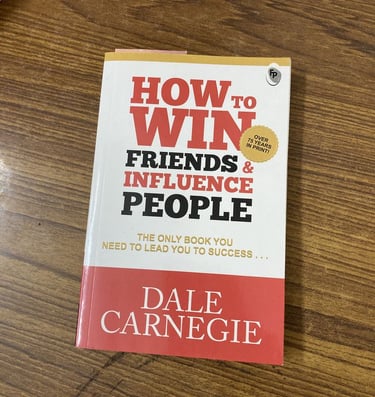How to Win Friends & Influence People | Expand Your Network & Influence Ethically
Discover lessons from How to Win Friends & Influence People by Dale Carnegie. Learn practical principles to expand your social circle, communicate better, and ethically influence people.”
9/13/20253 min read


How How to Win Friends & Influence People Helps You Expand Your Social Circle & Influence the World
Introduction
How to Win Friends & Influence People by Dale Carnegie is one of the most famous self-help books ever written. Published first in 1936, its timeless principles have helped millions around the world improve communication, build stronger relationships, and gain influence.
This blog explores what the book teaches, how it helps you expand your network and influence people, and practical ways to apply its principles so you “win” in social and professional circles without compromising authenticity.
What the Book Teaches: Key Principles
Some of the main chapters (and their teachings) include:
Fundamental Techniques in Handling People – e.g., don’t criticize, condemn, or complain; give honest and sincere appreciation; arouse in others an eager want.
Six Ways to Make People Like You – such as becoming genuinely interested in others; smiling; remembering people’s names; being a good listener; talking in terms of the other person’s interests; making the other person feel important, sincerely.
Twelve Ways to Win People to Your Way of Thinking – avoid arguments; begin in a friendly way; show respect for others’ opinions; admit when you are wrong; let others talk more, etc.
Be a Leader: Changing People Without Giving Offense or Arousing Resentment – praising, letting others save face, calling out mistakes indirectly, etc.
How It Helps You Expand Your Network & Influence People
Using these teachings from Carnegie’s book can help in multiple ways:
Build deeper connections quickly
By showing genuine interest in others, listening well, remembering names, etc., you make people feel valued. That encourages connection, trust, and reciprocity — key to building a strong social circle.Influence respectfully and authentically
The principles teach you how to influence without force: by understanding others’ desires (“arouse in them an eager want”), respecting their viewpoint, admitting mistakes, and avoiding criticism. Influence gained this way tends to be more lasting and positive.Increase your social and professional opportunities
When people find you likable, trustworthy, and good at communication, they are more likely to include you in projects, refer opportunities, invite you socially, or recommend you. This amplifies your “external world” success: networking, leadership, and collaborations.Improve leadership, persuasion & negotiation skills
In both professional and social settings, being able to persuade others, lead without causing resentment, and handle conflicts amicably is a powerful skill. Carnegie’s teachings provide tools for that.Enhance self-confidence & personal growth
As you practice these principles, you become more skilled socially; confidence grows. You learn humility (admitting mistakes), sincerity, and empathy. Those shifts in internal growth that reflect outwardly.
Practical Ways to Apply the Principles
Here are actionable steps you can take daily to integrate Carnegie’s wisdom:
Make a list of important people in your life (colleagues, neighbors, acquaintances) and practice remembering and using their names properly.
In conversations, ask more questions than speak; inquire genuinely about their interests.
Smile more often. Small as it seems, a warm greeting or smile sets a positive tone.
When conflict arises, avoid criticism or condemnation; try to see the other person’s point of view and start friendly.
When you’re wrong, admit it openly — this wins respect and others are more open to listening.
Give sincere appreciation. Acknowledge efforts, however small. Avoid flattery, but be genuine.
Try to speak in terms of others' interests. E.g., in a business meeting, frame things around what the other party would benefit.
Overcoming Common Challenges & Staying Authentic
While applying the book's principles, it’s important to remain authentic. Some people may misuse techniques manipulatively, which can feel disingenuous. Also, in cultural or personality differences, some principles may need adapting. Key is: don’t use Carnegie’s methods as mere tools — embody the values of respect, sincerity, empathy. That builds trust instead of shallow influence.
Why This Book Still Matters Today
Despite being published nearly a century ago, the fundamentals of human behavior and needs — respect, appreciation, connection — haven’t changed.
In the age of social media, networking, remote work, and global connections, being good at relationships matters more than ever.
Techniques of communication, influence, and leadership remain core soft skills in personal and professional success.
Conclusion
How to Win Friends & Influence People is more than just social advice — it’s a strategic guide to expanding your circle, influencing others, and growing yourself. By practicing its principles, you not only “win” friends, you build genuine relationships, increase your influence, and shine in your external world, all while staying true to yourself.
